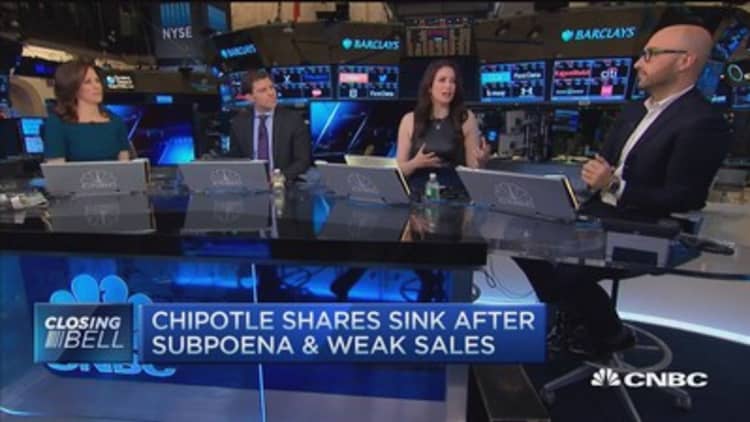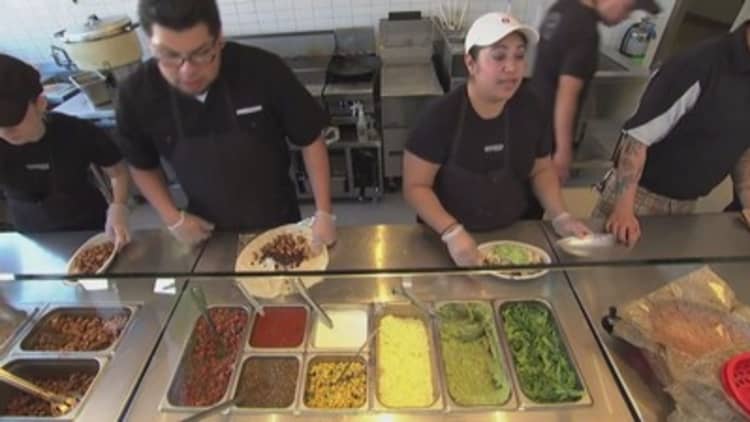


The "farm-to-table" movement — emphasizing ethically, locally sourced food — evokes a pastoral fantasy of a simpler time. But now that a bellwether of the trend is under scrutiny for foodborne illnesses, reality may be testing the limits of the farm-to-table foodie craze, experts told CNBC.
Chipotle Mexican Grill warned investors Wednesday that sales had been pummeled by fallout from E. coli and norovirus incidents. It also said a grand jury has subpoenaed it in an investigation of a separate norovirus outbreak.
The latest news sent yet another shock wave through a chain known for touting local ingredients on an unprecedented scale. Is the dining darling's downward spiral a death knell for local sourcing?
No good deed goes unpunished, said Joe Bastianich, host of CNBC's "Restaurant Startup."
"These are viruses that are transmitted because the produce is real," Bastianich said. "Because it comes from the earth — the dirt. It's not grown in some lab, in some vaporless environment. It's real stuff. And that is both a positive and a negative."
Local produce is bought during the summer months, primarily, and accounts for about 10 percent of Chipotle's overall purchase of produce in a given year, the company's co-CEO, Steve Ells, told analysts at the Bernstein Consumer Summit in December.
It has taken the limelight in recent months because determining the cause of an outbreak is already a lengthy ordeal. That's compounded when fresh produce from many suppliers could be spoiled and no longer available for testing by the time an outbreak is detected.
"Maybe there is a bit of naiveness," said Bastianich. "I think [Ells] and the company are so committed to that idea of direct products. It is such a good idea. But then, of course, you have to be cognizant of what that brings with it. In this case it didn't work out great for them."
Shares of Chipotle have dropped 31 percent since it was first linked to an E. coli outbreak in the Pacific Northwest. But other fast food restaurants continue to pile on commitments for more natural fare.
The latest? Carl's Jr., announcing the launch of all-natural turkey burger patties, and Subway, with cage-free eggs.
Rather than the end for natural foods, it may be just the beginning as restaurants search for the sweet spot between an industrial supply chain and a truly local one with hundreds of farmers individually supplying local restaurants, an expert said.
"There are two things going against these local supply chains," said John Gray, associate professor of operations at The Ohio State University's Fisher College of Business. "My research has shown that larger firms do seem to have more consistent compliance [with food safety standards]. Instead of dealing with one firm, dealing with a hundred firms does increase risk."
But both Gray and Bastianich said that Chipotle will stick with its "fundamental DNA" of fresh food — and long term, that's a good thing. Indeed, Gray's research has shown that attention to food safety can keep compliance from fading to the background among priorities like cost, delivery and animal welfare (at least for a while).
Ells reiterated that at the Bernstein Consumer Summit.
"In regards to local farms, there will be robust testing procedures that will need to be in place for all of our suppliers, whether they're large or small," he said. "Some of the smaller suppliers might have a hard time implementing these robust testing procedures initially. We'll help them. Not all will be on board, for sure, but we think that most will."
And as Chipotle searches for the right balance of of costly testing and small suppliers, regulators do too.
Local foods were spotlighted in a 2015 USDA report as a priority for goals like "enhancing the rural economy, the environment, food access and nutrition, informing consumer demand, and strengthening agricultural producers and markets." But practices such as the prolific use of manure at local farms has presented challenges in properly implementing The Food Safety Modernization Act, the USDA report said.
"Currently, food safety in produce is a hodgepodge of decisions by individuals, grower organizations, buyers and governments that can vary by farm size, commodity, region and country," the researchers wrote.
"Obviously it's a super-ambitious idea," Bastianich said. "[Chipotle is] an incredible company, [co-CEO Steve Ells] is an incredible guy to think about all this. And this is a bump in the road ... unfortunately, it's going to hurt."
Chipotle did not immediately respond to a request for comment.
Tune in to "Restaurant Startup," Wednesdays at 10 p.m. ET/PT on CNBC, to watch entrepreneurs compete for the backing of the show's celebrity restaurateurs.
— CNBC's Katie Little contributed to this report.




